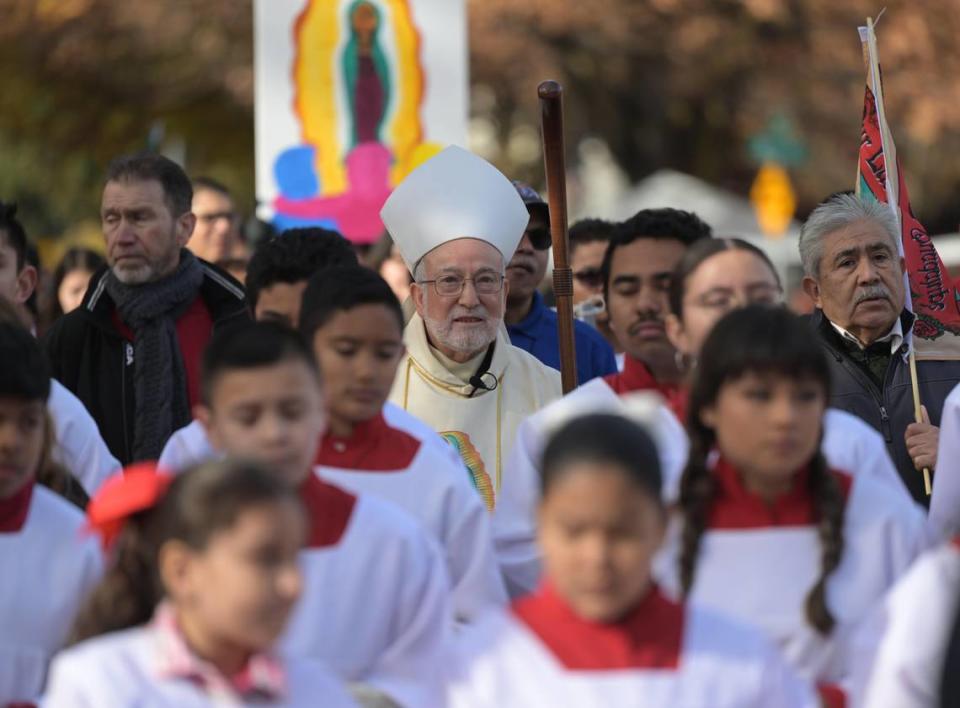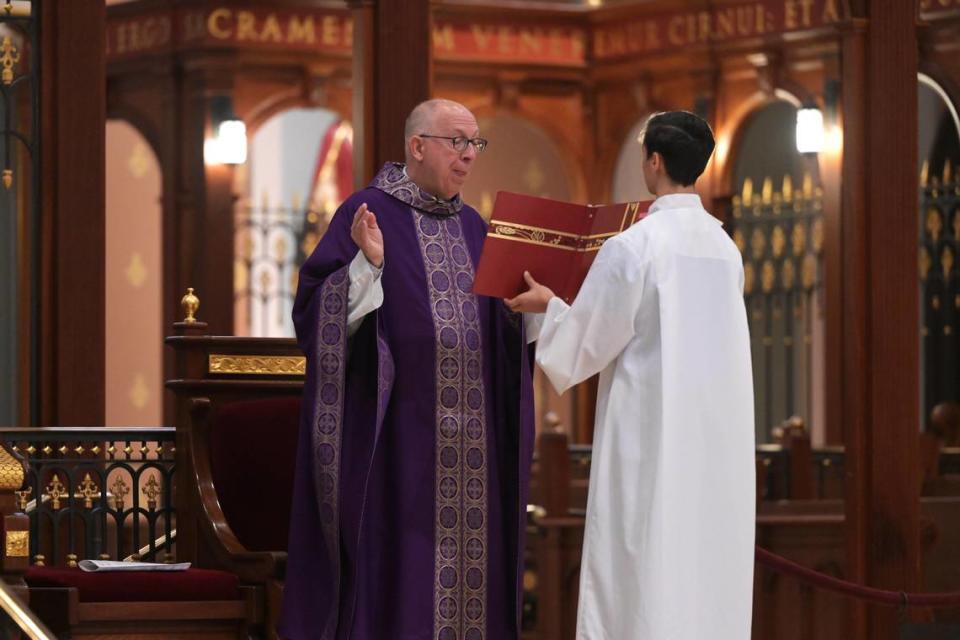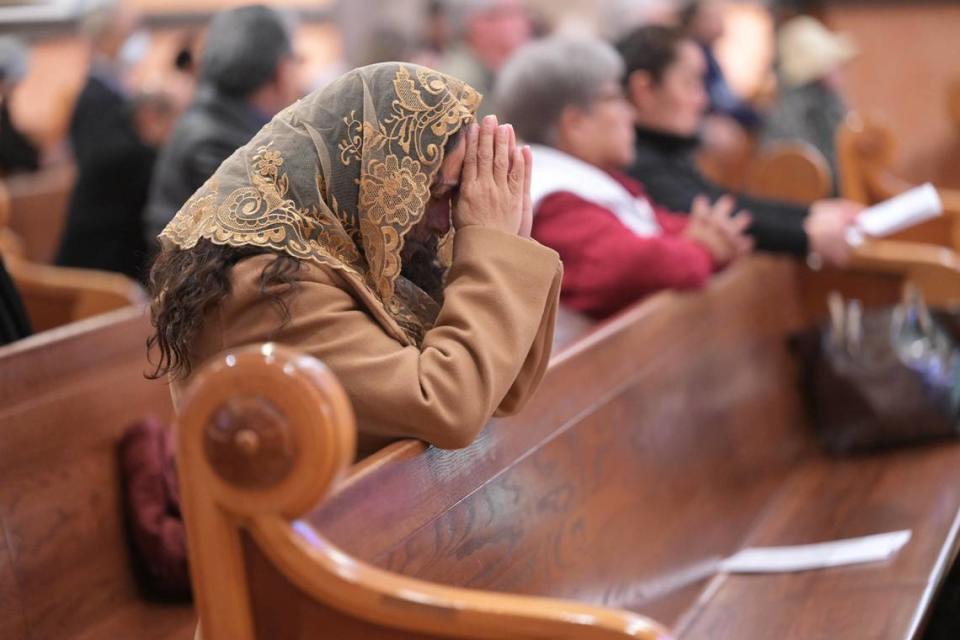Catholic Diocese of Sacramento to declare bankruptcy protection amid clergy sex abuse lawsuits
- Oops!Something went wrong.Please try again later.
The Roman Catholic Diocese of Sacramento announced Saturday that it is filing for bankruptcy protection, joining dozens of others that have been financially battered by sexual abuse lawsuits.
“After much prayer and careful consideration, it is now clear to me that this is the only way available to me to resolve these claims as fairly as possible,” Bishop Jaime Soto said in a statement posted to the diocese website. “There are many victim-survivors awaiting compensation for the reprehensible sins committed against them.
“The diocese faces more than 250 lawsuits alleging sexual abuse by clergy or other church staff. The reorganization process will allow me to equitably respond to the large number of those who are victim-survivors of abuse.”
The decision to file for Chapter 11 bankruptcy protection, which is expected to occur in March, means “a court would oversee the distribution of available assets to satisfy claims against the diocese,” the statement said.
“Victim-survivors of clergy sexual abuse would be represented in a court-supervised proceeding. A fund would be established to be distributed to victim-survivors as equitably as possible. Without such a process, it is likely that diocesan funds would be exhausted by the first cases to proceed to trial, leaving nothing for the many other victim-survivors still waiting for compensation.”
Diocese spokesman Frank Lienert told The Sacramento Bee on Saturday that the diocese planned to begin announcing the decision to parishioners at evening masses Saturday and in a “letter to the faithful.”
On Sunday before presiding over Mass at Our Lady of Guadalupe Church in the Southside Park section of downtown Sacramento, Soto called his decision to enter into reorganization “difficult.”
“I’m sure people are going to be mad at me, mad at the church, and there will be some people who try to blame the victims,” he said. “Men, priests, and others in the church have abused the trust that innocent people put in them.
“It’s a very dark legacy in our history, and we have to be held responsible. And I, as bishop, have to try to make amends for that. I think it’s important to not blame people for bringing to light what happened in their lives.”

The diocese has indicated in past months that it might take such a step, with Soto writing in a March issue of the Catholic Herald that more than 200 lawsuits had been filed against the diocese alleging sexual abuse of minors.
The onslaught of lawsuits stemmed from a measure signed into law in California in 2019 that extended the statute of limitations for such cases, and other states have passed similar measures.
“To learn of this staggering number of claims is truly heartbreaking,” Soto wrote then. “These claims represent real people whose lives have been damaged by the sins of individuals whom they had been taught to trust.
“I apologize deeply for these sins and for the harm they have caused.”
The Sacramento diocese also has published a list of 46 “credibly accused clergy” who served in the Diocese of Sacramento from 1933 through 2018, many of them now deceased and some listed as being fugitives from justice.
In recent months, the Diocese of San Francisco, Diocese of Oakland, Diocese of Stockton, and Diocese of Santa Rosa have filed for bankruptcy protection, and San Diego’s diocese has said it may have to follow suit.
San Francisco Archbishop Salvatore J. Cordileone wrote in August that the diocese was making the move because it faces more than 500 sexual abuse lawsuits.
“We believe the bankruptcy process is the best way to provide a compassionate and equitable solution for survivors of abuse while ensuring that we continue the vital ministries to the faithful and to the communities that rely on our services and charity,” he wrote. “The Archdiocese of San Francisco joins a growing list of dioceses in the United States and California that have filed for protection under the bankruptcy laws.
“Some of these dioceses have already restructured and emerged from this process.”
The Catholic News Agency says more than two dozen dioceses have filed for bankruptcy protection in the past decade, and since states extended the statute of limitations for sexual abuse lawsuits numerous law forms have focused their efforts at filing suits of behalf of victims of clergy and others.

Attorney Mike Reck of Jeff Anderson and Associates said he has handled thousands of lawsuits against various dioceses, including 48 against Sacramento’s.
He said Saturday that the move to file for bankruptcy protection makes it more difficult for survivors of abuse to have their stories told in court, but added that the move does not mean that victims will lose out on recovering damages.
“I think that it is an effort by the bishop to protect financial assets and manage risk and to stop the trials which publicly disclose what they knew and when they knew it about their abusers,” Reck said. “That’s really the key here.
“When the bishop files for bankruptcy, all the trials get frozen and so the depositions stop, the testimony stops, the discovery stops and we have to move the cases from state court to federal court.
“But the survivors need to know that bankruptcy is not a get-out-of-jail-free card for the diocese. Their lawsuits shift over to the federal bankruptcy court and become claims in bankruptcy court. They’re still going to be able to receive compensation.”
Melanie Sakoda, the survivor support director for the Survivors Network of those Abused by Priests, or SNAP, said the decision by the diocese is “a dangerous one for the public” because it can limit the amount that a plaintiff can recover from the church and is “a misapplication of bankruptcy law.”
“I just think the Catholic Church isn’t financially bankrupt,” Sakoda said. “I think they’re morally bankrupt, and this is just another example.
“They file for bankruptcy to save money because it will mean that the people who filed their lawsuits will get less money than they would have through their lawsuits.”
Sakoda added that bankruptcy may allow for the names of some abusers to remain secret.
“There’s no provision in bankruptcy for those names to become public,” Sakoda said, adding that SNAP has a list of 103 accused clergy members from the Sacramento Diocese.
The diocese said Saturday that the bankruptcy filing will not change the church’s duty.
“The pastoral work of the Catholic Church would continue during the reorganization,” the statement said. “The filing would allow the diocese to continue its support of parishes and charitable organizations while a settlement is reached.”

The statement said Soto also asked for prayers “for the victim-survivors of clergy sexual abuse, and to remember these victims are not to blame for the difficult decision to file for bankruptcy.”
“It is the sickening sin of sexual abuse – and the failure of church leadership to address it appropriately -- that brought us to this place,” Soto said. “I must atone for these sins.
“I ask you to join me in praying for the healing of victim-survivors. The pain inflicted on them lasts a lifetime, and so our atonement must be a lifetime commitment.”
The Bee’s Hector Amezcua and Maya Miller contributed to this story.

